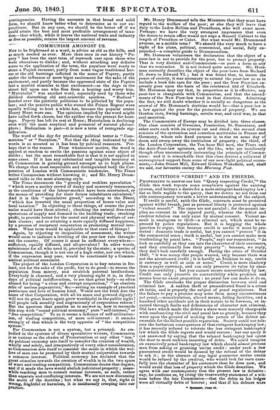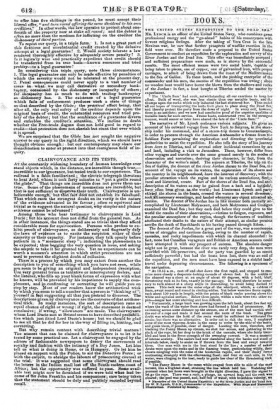FACTITIOUS "CREDIT" AND ITS FRIENDS.
PROFESSING to answer our late "Query respecting.Credit," the Globe this week repeats some complaints against the existing system, and betrays a desire for a more stringent bankruptcy law ; but so little replies to the query, that we derive no aid from our able contemporary towards a better understanding of the subject. If credit is men], saith the Globe, contracts must be protected against wilful breach, just as personal liberty is protected against "violent assault." The cases are not parallel ; for the assault im- plies no consent in the injured party, whereas the debtor and creditor relation can only exist by mutual consent. Violent as- sault is analogous to theft—a criminal act, which must be re- pressed by police regulations. But it is begging the whole question to argue, that because credit is useful it must be pro- tected : domestic trade is useful, but you cannot" protect" it in the commercial sense ; truth is useful, but you cannot make men truthtelling by penal laws. "People," says our respondent, "do look as carefully as they can into the character of their customers, and they continually lose their property ": because, we reply, they don't look carefully enough. During the crisis of October 1847, "it was money that people wanted, only because there was not the accustomed credit ; it is hardly. an Trishism to say, credit is currency as well as coin or notes." Credit is more shadowy than a paper currency, and can only preserve its value by abso- lute convertibility; but you cannot secure convertibility by law. Credit can only preserve its convertibility while promises and means bear an exact proportion : no penal law can make it do so. The Globe overlooks the proper distinction between civil and criminal law. A sudden theft or premeditated fraud is a crime ab initio, and is properly the subject of penal regulations. But the failure to pay a promise may arise from many circumstances not penal,—miscalculation, altered means, failing faculties, and a hundred other accidents not in their nature to be foreseen, or in curred through faults and deficiencies of character not criminal. Old laws which made the debtor a slave were scarcely chargeable with confounding the civil and penal law so grossly, because they went upon the ground of making the person of the debtor an- swerable for the fullest possible reparation. Society could not tole- rate the barbarous consequences of that stringent bankruptcy law; it has recently refused to tolerate the less stringent bankruptcy law which the Globe regrets and would restore : but our query is not answered by saying that the relaxed bankruptcy law opens the door to more reckless incurring of debts. We could imagine an excessively penal bankruptcy law which should almost prevent men from asking or granting undue credit : under such a law guaranteed credit would be disused by the refusal of the debtot to ask it ; in the absence of any legal guarantee undue credit would be refused by the creditor, who would look far more care. fully into the character of his customers than he does now, and would avoid that loss of property which the Globe describes. We agree with our contemporary that the present law is delusive : nay, he confirms us, by citing the trustworthy statement of a wit- ness before the late Commission—that the debts in his ledger were all virtually -debts of honour ; and that if his debtors were
• Speitakfr,-0'mal TO.
to effer -him five shalings in the pound, he must accept their liberal offer, "and turn round ecring the same dividend to ltis own crettitors." In other words, the law operates to protect about one- fourth of the property now at stake all round; and the debtor is often no more than the medium for inflicting on the creditor the dishonesty of third-parties.
To repeat our query, in a triple form. 1. Is not a great part of this fictitious and unsubstantial credit created by the delusive attempt at a legal guarantee? 2, Would society tolerate a law rendered thoroughly effective by adequately severe penalty 3. Is it logicaly wise and practically expedient that credit should be transferred from its true basis—known resources and tried probity—to a legal guarantee? considering- this triple query, note three circumstances. 1. he legal guarantee can only be made effective by penalties of which the severity would not be tolerated at the present day.
2. Penal consequences could never apply to a vast number of cases in-- what, we may call derivative or seconder, bank- ruptcy, ooeasioned by the dishonesty or incapacity o others; for incapacity has as much to do with trading bankruptcy as dishonesty has. 3. The existence of a legal' guarantee hich fails of enforcement produces such a state of things as hat described by the Globe; the practical effect being, that after all, the only real safety of the creditor depends upon the original basis of credit, the substantial resources and tried pro-. bir of the debtor; but that the semblance of -a guarantee diverts anl enfeebles the c,reditor'a attention. We incline to doubt whether the Free-trade dogma does not hold good in regard to credit—that protection does not cherish but stunt that over which it is spread. We are surprised that the Globe has not sought the negative answer to our query in the right direction, which we should have thooght obvious enough:- but our contemporary may share our disinclination to enter at present into that contiguous field of in- quiry.



























 Previous page
Previous page